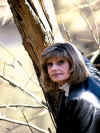| 11-14-05
Over the years sitting deer stands (sitting stands . . . does that add
up?) have served up many exciting incidents not involving deer. Two of
the most outstanding episodes have involved sharp-shinned
hawks . . . I call them Mother Nature’s buzz bombs.
I find it exciting to see a sharp-shin at any distance, but my deer
hunt on opening day (last Saturday) proved to be the greatest of all--the
chance to view this beauty (presumably a female) at point-blank range .
. . like eyeball-to-eyeball.
I am sitting one of two stands that I hunt (often with success) in a
brush-infested Boone County fencerow that borders (at my back) a 20-acre
expanse of large trees choked by dense briers. Looking eastward, my view
commands a brushy hillside and willow swale that runs for a quarter of
a mile or more to standing corn as far as my binoculars can see.
It is a bright and balmy afternoon, but as the shadow of my walnut tree
lengthens, and the day heads toward dusk, I catch aerial movement in my
left peripheral view. This freezes any slight movement I may be making,
because while I know this intruder probably is not a deer, I want to see
it as it buzzes past. And I do not want to spook whatever it may be.
Seconds later this sharp-shin I take (by size) to be a female zips in
at supersonic speed and wing-brakes with feathers afluff on the limb of
a little hackberry tree. . . two to three feet from my face.
As the bird relaxes, its nervous reaction tells me it knows this strange
mountain of protoplasm perched on top of the ladder is not quite right.
But, while making a decision about what evasive action it might take to
escape, it offers a great chance to record its features.
With unblinking eyes that must be as big as saucers, I know I can’t
even think about reaching for the camera that hangs from a limb to my right.
“Just try to remember as much as you can about this beautiful lady’s features,”
I tell myself, in the minute (give or take some seconds) that I have to
drink her in.
The episode ends as she takes her typical headlong dive from her perch,
her wings unfolding and grasping the air to propel her low, fast, on an
erratic, zigzag course across the picked soybean field, over the willow
swale, and out of sight.
When she is gone, and I am trying to calm an industrial-strength case
of “buck fever,” I ask myself: “OK, big hunter, what did you see?” But
for all of her beauty and intriguing features I wanted to store forever
in my faulty cerebellum, I can only remember wild, dark-red eyes, the long,
bright-bright yellow legs conspicuously void of feathers, and the
four crosswise, half-inch-wide black streaks on the underside of a long
tail. I will settle for that.
PAULA YEAGER--Memorial services
for Paula Yeager, executive director of the Indiana Wildlife Federation
(IWF) for the last six years, were conducted at Randall & Roberts Funeral
Home at Fishers Monday afternoon.
Paula died on November 9 of an eight-year fight with cancer, but not
before she knew the Indiana Department of Natural Resources (DNR) had officially
taken control of Goose Pond, a huge southwestern Indiana wetlands area
that she--and the IWF--had strived to save with other partners in the acquisition.
Having been honored by the DNR as the 2001 Conservationist of the Year,
Paula will be remembered as a fierce fighter for wildlife and natural resources,
and as the spearhead in the fight against deer-pen hunting. But she was
active in many facets of the state and national conservation picture. Her
husband, John, has asked that memorial contributions to the IWF be sent
to that organization, 950 Rangeline Road, Suite A, Carmel, IN 46032.
Cliick on thumbnail
image for enlarged view.

|
Paula
Yeager died at age 50 after an eight-year battle with cancer, and a six-year
fight for Hoosier natural and wildlife resources. |
|

